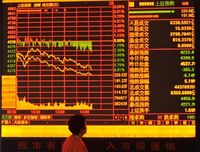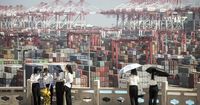The global financial landscape is experiencing unprecedented turbulence as escalating trade tensions between the United States and China trigger a massive sell-off in stock markets worldwide. On April 7, 2025, Asian stock markets plummeted by 7.9%, marking the worst single-day decline in over 16 years, as investors reacted to China's announcement of retaliatory tariffs against U.S. goods.
The Hang Seng index in Hong Kong closed down more than 13%, the steepest drop in over a decade, following Beijing's declaration of a 34% tariff on all imports from the U.S. This development sent shockwaves through the financial community, with the technology sector in Hong Kong suffering a staggering 17% decline. Taiwan's stock index also recorded its largest drop in history, prompting the activation of a "circuit breaker" mechanism to temporarily halt trading.
The turmoil extended beyond Asia, with Dow Jones futures in the U.S. falling by more than 1,200 points, equivalent to a 3.16% drop. Additionally, oil prices fell below $60 per barrel, further compounding the market's woes. Credit default swaps (CDS) in Asia surged to their highest levels since the onset of the COVID-19 pandemic, reflecting rising fears among investors.
In the U.S., the recent stock market fluctuations are compounded by President Donald Trump's controversial trade policies. According to an article by The Economist, titled "Will Trump’s trade war cause a global recession?", the latest tariff announcements from the U.S. took the markets by surprise. On April 2, 2025, the U.S. government announced new tariffs on imports, implementing a base tax of 10% on most goods and retaliatory taxes that could reach up to 50% for certain economies. The base tax took effect at 12:01 AM on April 5, while retaliatory taxes are set to begin at 12:01 AM on April 9, 2025, Eastern Time.
These tariff measures led to immediate repercussions in the stock markets. Following Trump's announcement, the Russell 3000 index dropped by 5% on April 3, and fell another 6% the next day after China's retaliatory tariffs were revealed. The financial turmoil has raised alarms among analysts, with JPMorgan Chase estimating a 60% chance of a global recession occurring this year.
Market indicators suggest a shift in investor sentiment, as cyclical stocks—those sensitive to economic cycles—have underperformed defensive stocks, which tend to be more stable during downturns. In the past week, global cyclical stocks lagged behind defensive stocks by approximately 8 percentage points, the largest gap since the COVID-19 lockdowns began in 2020. The MSCI World index, which represents about 85% of market capitalization in 23 wealthy countries, has experienced a smaller decline compared to U.S. indices.
The economic landscape, however, is not entirely bleak. On April 4, 2025, U.S. statisticians reported that the economy added 228,000 jobs in March, significantly exceeding expectations. A weekly index from the Dallas branch of the Federal Reserve indicates that the U.S. economy is growing at an annual rate of over 2%. This data points to a resilience in the U.S. economy, even amidst the heightened trade tensions.
Despite the chaos in the markets, Trump and his economic team remain steadfast in their approach. Speaking on Air Force One on April 6, Trump asserted, "Forget the market for a second - we have all the advantages." His administration has signaled that it will not alter its tariff policies, even in light of the market's volatility. Win Thin from Brown Brothers Harriman remarked, "With this message, stock markets are likely to continue their sell-off, while U.S. Treasury bonds are expected to rise in value."
The ongoing sell-off reflects growing investor concern over the potential long-term impacts of the trade war. Analysts warn of the possibility that both the U.S. and China could face significant economic repercussions if the conflict escalates further. Tim Waterer, a senior market analyst at KCM Trade in Sydney, noted, "Traders are anxiously watching the two largest economies in the world clash over tariffs, fearing that both could suffer blows from a prolonged economic battle."
In response to the market instability, China has indicated its readiness to adjust monetary policy to mitigate the impact of U.S. tariffs. A commentary in the People's Daily, the official newspaper of the Chinese Communist Party, suggested that China has room to cut reserve requirements and interest rates if necessary.
Meanwhile, Japanese Prime Minister Shigeru Ishiba has announced plans to visit the U.S. to propose a comprehensive agreement on tariffs with Trump. Previously, Trump had expressed a willingness to reduce tariffs if other nations could offer something "extraordinary" in return.
As the world grapples with these escalating tensions, investors are left to navigate a landscape that is rapidly changing. The potential for further volatility looms large, with many experts predicting that the current market conditions could persist for some time. Jun Bei Liu, founder of Ten Cap Pty, remarked, "We are witnessing investors throwing in the towel. This volatility is likely to continue for a while."
The financial community is now more than ever aware of the delicate balance between trade policies and market stability, as the ramifications of these decisions unfold on a global scale. With both the U.S. and China standing firm on their positions, the prospects for a swift resolution seem distant, leaving markets in a precarious state.





